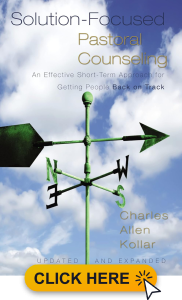
Solution-Focused Pastoral Counseling: An Effective Short-Term Approach for Getting People Back on Track
1. How do you decide when to confront sin in counseling, and what form of confrontation to use?
Deciding when to confront sin in counseling depends on two major factors. First, the level of trust the counselee has with the counselor, and second, the willingness of the counselee (“Counseling Methods,” n.d.). Specifically, if the counselee is in a willing position, rather than a blaming or attending position, the probability of confrontational effectiveness significantly increases (Kollar, 2011).
If adequate trust and willingness exist, then numerous forms of confrontation are available. First, and possibly most effective, is inquiry (McMinn, 1996). Pondering is another form of confrontation that may be effective as long as the counselor avoids manipulation (McMinn, 1996). Pondering disarms the client while allowing the discovery process to occur. Another form of confrontation, which is similar to the powerful downward arrow technique in cognitive therapy, is to help the counselee visualize the end by asking, “Then what?” (“Counseling Methods,” n.d.). A fourth form of confrontation is silence, which may cause the client some discomfort, but allows the counselor to abstain from encouraging sin (McMinn, 1996). Fifth, direct censure may be effective when extreme levels of trust exist; but caution is advised as laying down the law may actually arouse the counselee’s “sinful passions” (“Counseling Methods,” n.d.; Romans 7:5, New American Standard). Personally, the utilization of empathic confrontation may be the most powerful approach by metaphorically holding up a mirror that facilitates truth discovery while simultaneously serving clients (1 Corinthians 9:19-23, The Message).
______________________________________
- Counseling methods related to confrontation and confession [Video presentation]. (n.d.). Retrieved from http://bb7.liberty.edu/bbcswebdav/pid-17127454-dt-content-rid-100343955_1/courses/PACO506_B01_201240/Course%20Content/Week%207_%20%20Sin%2C%20Confession%2C%20and%20Redemption%20in%20Counseling/Learning%20Resources/Confrontation%20and%20Confession%20in%20Christian%20Counseling/506M7P2_1206/index.html
- Kollar, C. A. (2011). Solution-focused pastoral counseling: An effective short-term approach for getting people back on track. Grand Rapids, MI: Zondervan.
- McMinn, M. R. (1996). Psychology, theology, and spirituality in Christian counseling. Carol Stream, IL: Tyndale House.


